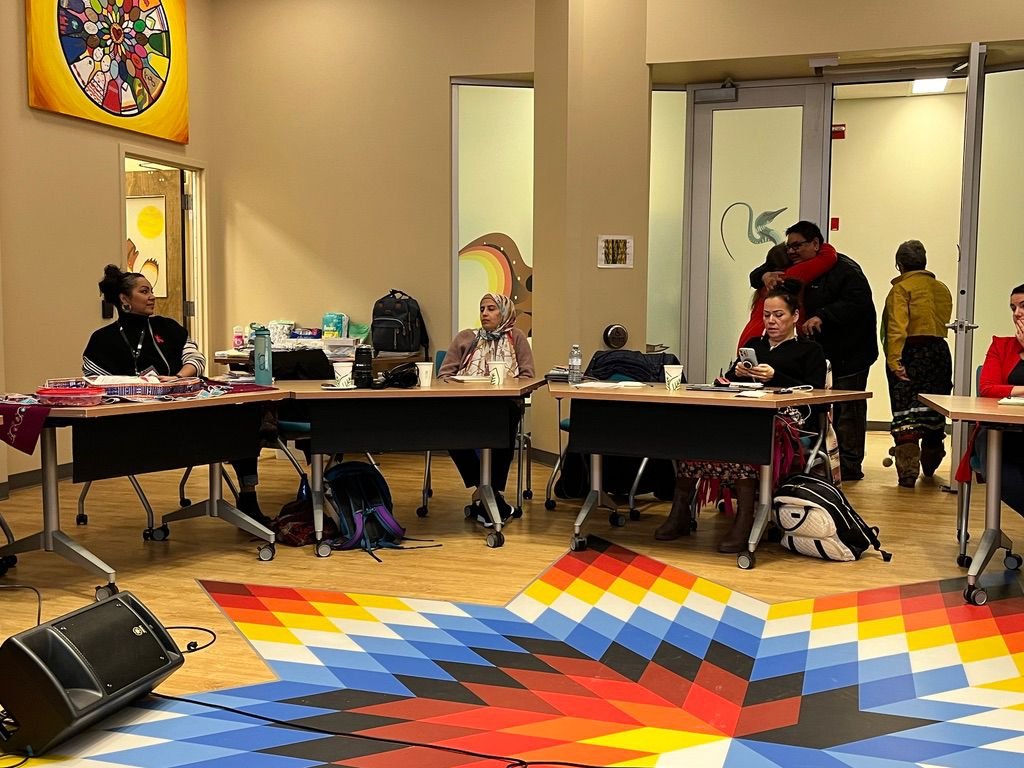Fostering Matriarchal Resilience
Chasity Delorme
Impact
The researcher developed the “Mother's Bundle” project, which was adapted to various cultural contexts, including working with Indigenous communities and international partners such as Ecuadorian midwives.
The research highlighted and responded to the cultural discrimination often present in Western healthcare systems, promoting equitable access to care, especially in remote Indigenous communities.
By adapting programs like “Mama Pods” and Nato’wehowin, this research created health support that is specifically designed for First Nations and Métis communities. This approach empowered mothers, strengthened community ownership, and ensured long-term relevance and sustainability.
This work is expected to continue fostering positive change, enhancing individual mental wellness and contributing to the broader community’s resilience and collective strength.
Moving forward, the Fostering Matriarchal Resilience project will focus on adapting the “Mother’s Bundle” to support Indigenous women with HIV, especially around breastfeeding. Next steps include creating a dedicated Breastfeeding Support Bundle and tailoring it for HIV-positive mothers.








“As a result of the opportunities provided by this award, I am now considering pursuing a PhD to further my research in Indigenous health and contribute to the development of culturally safe healthcare models on a larger scale. This experience has fueled my passion for this field, and I look forward to continuing this critical work.”
— Chasity Delorme
-
Saskatchewan
-
Studentship
-
First Nation’s University of Canada
-
Saskatchewan Health Authority, Western Region III Metis Nation-SK
-
Mitacs, Saskatchewan Health Research Foundation (SHRF)
-
2023-2024
-
Indigenous Community Mental Health
-
Indigenous Community, Women
About the Project
The research project focused on restoring Indigenous matriarchal resilience by developing culturally sensitive mental health programs for pregnant Indigenous girls and young Indigenous mothers. It aimed to support these young women through the mental health challenges of pregnancy and parenting by integrating traditional Indigenous birthing practices and ways of knowing into care models. The researcher studied successful programs like Mama Pods and Nato’wehowin and adapted them to better reflect the needs and cultures of First Nations and Métis communities. The researcher then developed a "Mother’s Bundle", a program combining traditional Indigenous knowledge with modern healthcare practices, supporting birthing, parenting, and mental wellness in ways that honor cultural identity and promote community pride.
Methodology
The research project used a community-centered and mixed-methods approach to develop culturally sensitive mental health support for Indigenous young mothers. Data was gathered through in-depth interviews with Indigenous pregnant girls and young mothers, as well as consultations with Knowledge Keepers, Elders, cultural leaders, and other community stakeholders. Engagement took place in both urban and rural areas within the Western Region III Métis Nation–SK service area. The project also held collaborative workshops, cultural events, and traditional knowledge-sharing gatherings to ensure the interventions were informed by lived experience and cultural wisdom. Using participatory action research principles, the community played an active role in co-designing the mental health programs. The team analyzed the effectiveness of existing models like Mama Pods and Nato’wehowin, identifying culturally relevant practices and adapting them to meet the specific needs of First Nations and Métis communities. This holistic and inclusive method ensured that the final interventions were not only effective but also culturally safe and meaningful.
Findings
Culturally Relevant Care Builds Trust - Participants preferred maternal care that reflected their cultural values, which helped build trust, a sense of belonging, and stronger mental health support.
Elder and Community Involvement Strengthens Wellness - Involving Elders and community members was key to emotional resilience. Their guidance created safe spaces and encouraged healing through shared cultural knowledge.
Adapting Models Improves Outcomes - Tailoring programs like Mama Pods and Nato’wehowin to fit Métis communities led to greater engagement and more effective support, showing that culturally adapted care works better.
Cultural Connection Builds Resilience - Mothers who stayed connected to their culture and community showed stronger coping skills and reduced isolation, which directly improved mental wellness.
Global Interest in Culturally Grounded Care - Midwives from Ecuador expressed interest in adapting the Mother’s Bundle, showing its potential to support maternal health in other cultural contexts. This highlighted the global relevance of Indigenous knowledge and opened doors for future international collaboration.
Project Outreach
The research project expanded beyond its original scope through international interest and collaboration. The researcher shared the “Mother’s Bundle” with a team in Peru, in addition to which midwives from Ecuador visited and expressed interest in adapting it to their own cultural practices. These engagements, along with strengthened partnerships in South America and local communities, showed the bundle’s broad relevance. By blending mental health care with cultural traditions, the project created a flexible model now being adapted across Indigenous communities in Saskatchewan and beyond.
Moving forward, the "Fostering Matriarchal Resilience" project will focus on the continued development and adaptation of the "Mother’s Bundle" to support Indigenous women living with HIV, particularly in the context of breastfeeding. The following next steps have been identified:
Creation of a Breastfeeding Support Bundle for indigenous Women with HIV
Adaptation of the Bundle for HIV-Positive Breastfeeding
Resources Created
Presentation at Indigenous Health Conferences:
The National Gathering of Graduate Students
Wabanaki-Labrador Indigenous Health Research Network in partnership with the NEIHR National Coordinating Centre
Cape Breton
Community Knowledge sharing sessions held both virtually and in person to introduce the “Mother’s Bundle” and discuss its application within local contexts.
Development of Educational Materials on Indigenous maternal care and breastfeeding, specifically targeting Indigenous women and their healthcare providers.
The “Mother’s Bundle” and related resources are now available online and shared through social media and Indigenous health forums, reaching audiences across Canada and internationally.
Research briefs and reports have been shared with partner organizations, community leaders, and relevant stakeholders to ensure the findings are accessible and applicable in health care settings.


